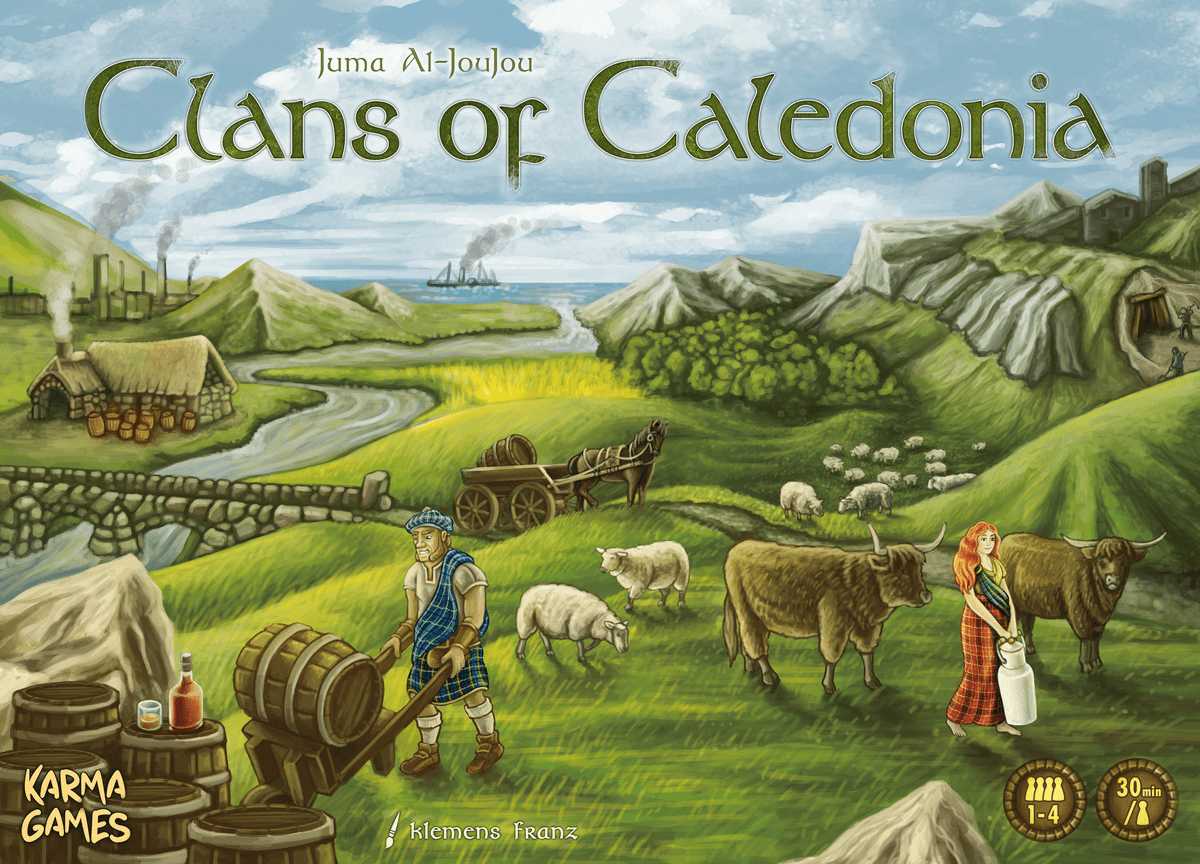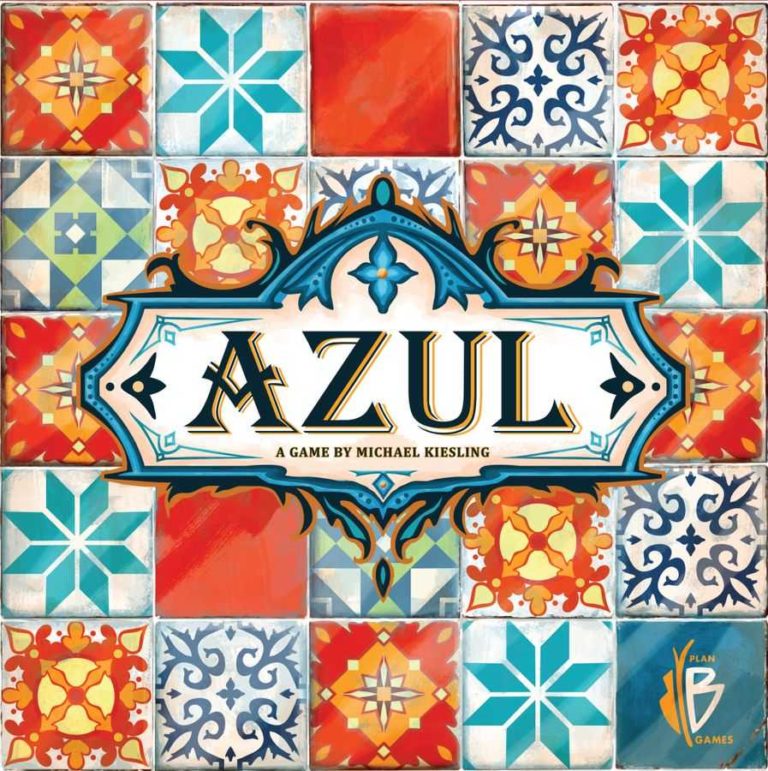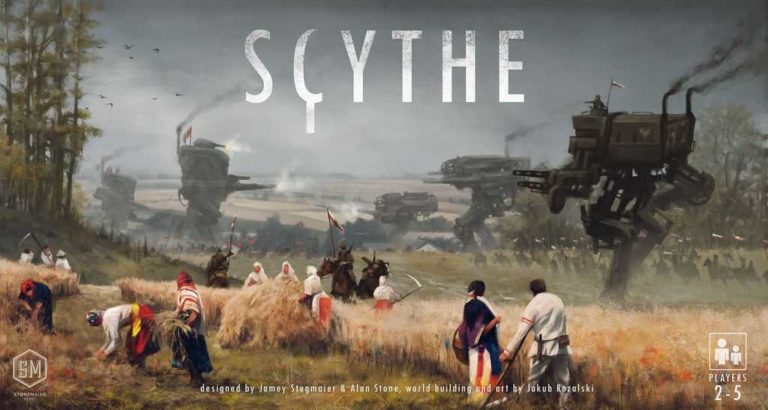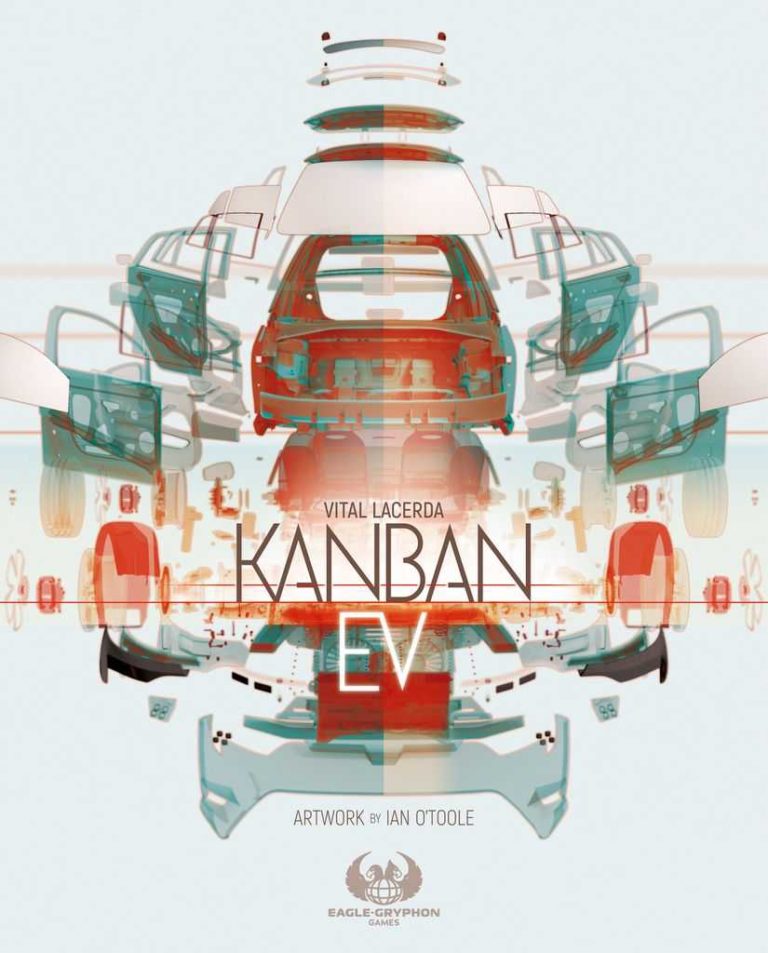In-Depth Clans Of Caledonia Review and Gameplay Overview
In-Depth Clans Of Caledonia Review and Gameplay Overview
My journey into the intricate and lush lands of Clans of Caledonia matured from a humble curiosity to a profound adoration, akin to the way a fine Scotch whisky develops its character over time. This game, a masterpiece of economic strategy set against the picturesque backdrop of 19th-century Scotland, has fascinated me and many others with its depth, strategic complexity, and beautifully crafted components. In this Clans of Caledonia review, I intend to share not just the mechanics and gameplay that make it unique, but also the vivid stories it weaves and the camaraderie it fosters among players. Each session is not just a game; it’s a journey through the rolling hills and bustling markets of Scotland, offering both fierce competition and the joy of discovery in every round.
Key Points:
- Clans of Caledonia offers a deep and immersive economic strategy experience set in 19th-century Scotland.
- The game combines resource management, strategic gameplay, and a dynamic market system.
- Players take on the roles of historic Scottish clans, each with unique abilities and goals.
- Key components include a modular game board, custom wooden pieces, and detailed clan sheets.
- Strategic gameplay involves trade, expansion, production, and mastering market dynamics and contracts.
- Player impressions highlight the game’s balanced gameplay, depth, and replayability.
- Clans of Caledonia stands out in the economic strategy genre with its dynamic market mechanism and thematic coherence.
From my first encounter, I realized that Clans of Caledonia is not just any board game; it’s an experience that challenges the mind, entertains the spirit, and enriches one’s understanding of economic dynamics and strategy. Whether it was the thrill of fulfilling a high-stakes export contract or the tension of a closely fought market battle, every game left me with memorable moments and valuable lessons. As an avid board gamer, I have traversed many worlds and encountered countless mechanics, but few games have captured my heart and mind as Clans of Caledonia has.
Exploring the Essence of Clans of Caledonia
At its core, Clans of Caledonia is a strategic tour de force that transports players to a time when Scotland was transitioning from an agricultural to an industrial nation. This game masterfully combines resource management, economic strategy, and a dynamic market system to create a deeply immersive experience. The essence of Clans of Caledonia lies in its ability to simulate the complexities of trade, expansion, and production in a historically rich setting, offering players a multifaceted challenge that is both intellectually stimulating and immensely satisfying.
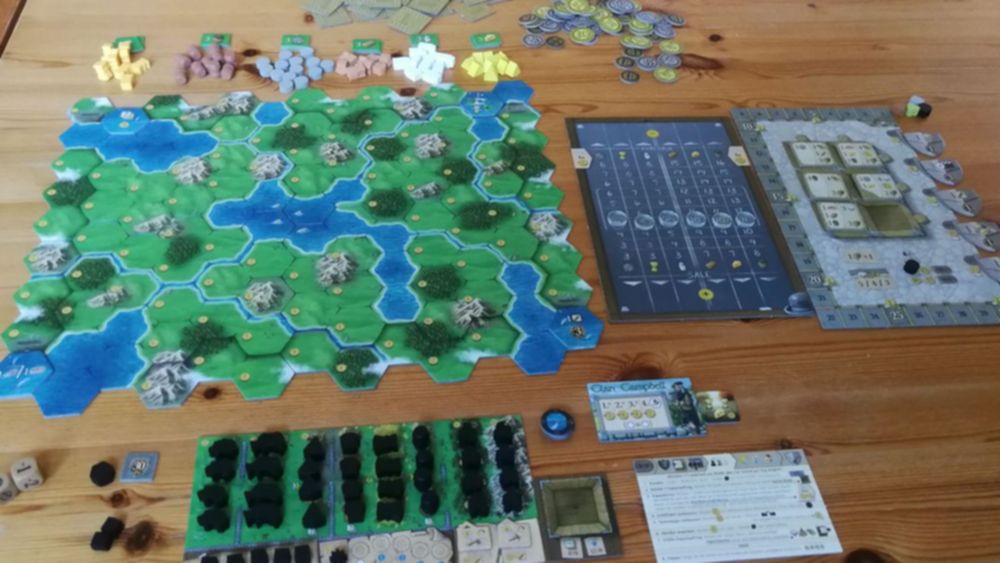
Overview of the Game’s Theme and Setting
Clans of Caledonia is set in 19th-century Scotland, a period of profound economic and social change. Players take on the roles of historic Scottish clans, each striving to expand their territory, trade goods, and achieve prosperity amidst the dawn of the industrial era. The theme is not just a backdrop; it is intricately woven into every aspect of the game, from the clan abilities reflecting historical strengths to the production of goods such as milk, wool, and the ever-valuable whiskey. The setting of Scotland adds a layer of richness and authenticity to the gameplay, making every decision feel significant and every victory sweet.
The immersion into Scottish culture and history is palpable, with the lush green landscapes of the game’s board and the thematic elements of clan life invoking a sense of belonging to that storied era. My own experiences playing Clans of Caledonia have often felt like a journey back in time, where strategy, not just luck, determines one’s legacy.
Players immersing themselves in Clans of Caledonia experience a rich and authentic journey back to 19th-century Scotland, where strategic decisions shape their legacy amidst a backdrop of historical significance.
Key Components and Game Materials
Opening the box of Clans of Caledonia is like unearthing a treasure trove of beautifully designed game materials that immediately draw you into its world. Among the key components are:
- A large, modular game board representing Scotland, complete with lochs, rivers, and regions for the clans to expand into.
- Custom wooden pieces for each clan, including cows, sheep, and barrels of whiskey, that not only look good on the board but also feel substantial to handle.
- Market board and export contract cards, central to the game’s economic dynamics, beautifully illustrated and easy to understand.
- Detailed clan sheets that outline the unique abilities, starting resources, and scoring potential of each clan, adding depth and replayability.
- High-quality coins and resource tokens that make transactions and production visually satisfying and easy to track.
The components are not merely functional; they enhance the overall experience by providing a tactile and visual representation of the game’s strategic depth. The thoughtfulness in the design of these materials cannot be overstated; they serve as the foundation upon which the strategic battles and economic negotiations play out.

Understanding the Basic Gameplay Mechanics
At its heart, Clans of Caledonia revolves around the strategic placement of workers on the board to control territory, produce goods, and fulfill contracts. Players must balance their clan’s strengths with the opportunities and challenges presented by the market and other players’ actions. Each turn, a player can choose from a variety of actions such as buying or selling goods on the market, expanding their clan’s presence on the map, or investing in technological advancements.
Understanding the basic gameplay mechanics is straightforward, but mastering them requires foresight, adaptability, and a keen sense of timing. The dynamic market, which fluctuates based on player actions, introduces an element of uncertainty, making each game unique and challenging. Success in Clans of Caledonia is achieved by those who can most effectively maneuver through the intricate web of economic and strategic decisions it presents.
Success in Clans of Caledonia is achieved by those who can most effectively maneuver through the intricate web of economic and strategic decisions it presents.
Deep Dive into Gameplay and Strategy
Going beyond the basics, Clans of Caledonia engages players in a deeper layer of strategy that combines economic savvy with tactical positioning. The game’s richness lies in its complex interplay between player actions, market movements, and clan abilities. As players delve deeper, they discover that every decision has far-reaching consequences, and victory requires both a well-executed plan and the flexibility to adapt to changing conditions.

Breaking Down the Actions: Trade, Expand, and Produce
In Clans of Caledonia, players have a plethora of actions at their disposal, each serving a distinct purpose in their quest for economic dominance. These actions include:

- Trade: Buying and selling goods on the market board to capitalize on fluctuating prices and fulfill lucrative contracts.
- Expand: Placing workers and buildings on the map to control territory and access valuable resources.
- Produce: Utilizing owned territories to generate goods, from basic resources like milk and wool to processed commodities like cheese and whiskey.
The strategic use of these actions is pivotal in navigating the complexities of Clans of Caledonia. Players must carefully balance their need for expansion and production with the opportunities and challenges presented by the market and other players’ strategies.
The Importance of Clan Selection and Abilities
Choosing the right clan at the start of Clans of Caledonia can significantly impact your strategy and gameplay experience. Each clan comes with its own unique ability that offers various benefits and specializations. For instance, some clans might excel in producing specific goods more efficiently, while others may have advantages in market trading or expanding their territory. This feature introduces a layer of strategic depth right from the get-go, encouraging players to tailor their game plan according to the selected clan’s strengths.
| Clan | Ability |
|---|---|
| MacKenzie | Produces whiskey more efficiently |
| MacDonald | Specializes in shipping and trade |
| Stewart | Gains bonuses for fulfilling export contracts |
| Campbell | Excels in cattle farming and milk production |
Understanding the abilities of each clan is crucial for formulating a robust strategy. The abilities can often complement certain play styles or strategies better than others. For example, if you prefer a gameplay focusing on trade and market manipulation, choosing a clan like MacDonald may give you the edge you need. On the other hand, if you’re aiming to score points through export contracts, Stewart might be your go-to clan.
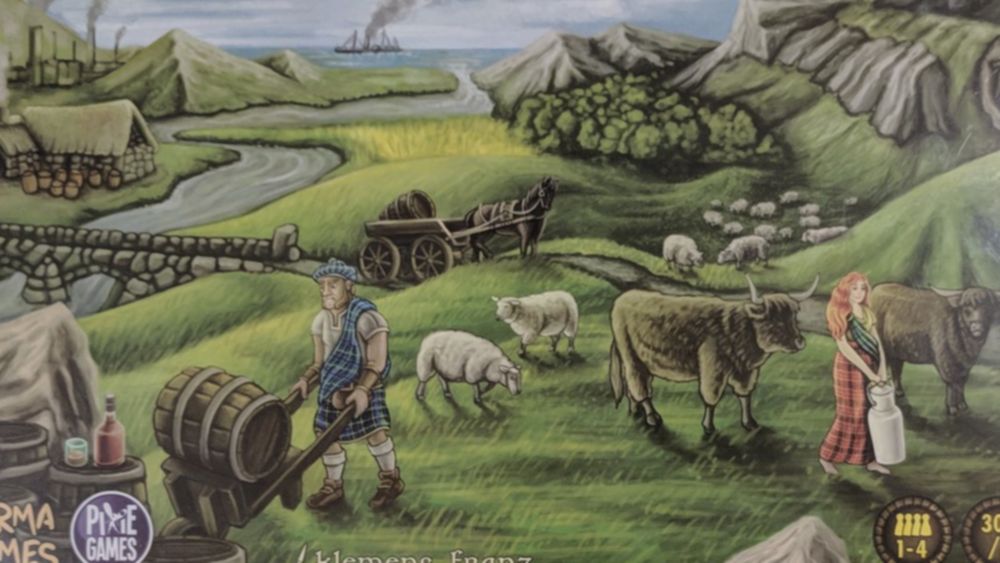
Choosing the right clan in Clans of Caledonia is crucial as each clan’s unique ability can greatly impact your strategy and gameplay experience.
Mastering the Market and Contracts for Victory
One of the most compelling aspects of Clans of Caledonia is mastering the dynamics of the market and contracts. The market board is a central element of the game where players can buy and sell goods at fluctuating prices. This constant change in goods’ prices adds a thrilling layer of strategy, as players need to predict and react to the market trends to maximize their profits or minimize expenses. Deciding when to sell goods to make money or when to buy resources needed for contracts can be game-changing.
Successfully completing contracts is another key to victory. Contracts require players to deliver specific combinations of goods and, upon completion, offer various rewards, including immediate points, money, and often additional resources or perks. Balancing your production capabilities with the demands of the contracts is crucial. Some contracts might align perfectly with your clan’s abilities, making them more lucrative for you than others. Playing smartly with the market and selecting contracts that complement your strategy and current production levels can significantly boost your chances of winning.
Strategies for Effective Use of Shipping and Export
Strategic use of shipping and export contracts plays a vital role in achieving success in Clans of Caledonia. Shipping enables players to expand their reach across the Scotland map, allowing for the placement of workers and the creation of outposts in non-adjacent regions. This can be particularly beneficial for accessing resources that are scarce in your immediate vicinity or for staking a claim in competitive areas of the board.
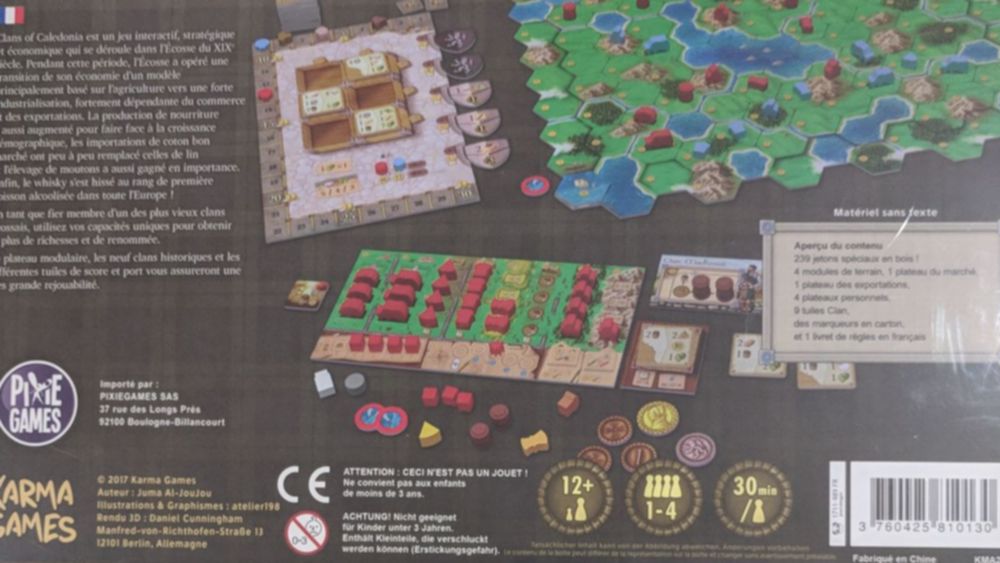
Export contracts, on the other hand, offer a lucrative avenue for scoring points. However, they require careful planning, as fulfilling these contracts often necessitates a diverse array of resources. Balancing your clan’s production capabilities with strategic shipping routes can open up opportunities for securing the right mix of goods needed for these contracts. This not only improves your scoring potential but can also disrupt your opponents’ plans by increasing the demand and reducing the availability of critical resources on the market.
Strategic shipping and export contracts are crucial for success in Clans of Caledonia by expanding reach, accessing resources, and scoring points while disrupting opponents’ plans.
Comparative Analysis with Similar Board Games
Clans of Caledonia stands out in the crowded field of economic strategy board games by offering a unique blend of mechanics and themes inspired by Scotland’s historical whisky production and trade era. Its straightforward yet deep gameplay distinguishes it from other titles in the genre.
Unique Features that Set Clans of Caledonia Apart
Several features set Clans of Caledonia apart from other economic strategy games. One significant aspect is its dynamic market mechanism, which mimics real-world supply and demand principles more closely than many of its peers. The ability for prices to fluctuate based on players’ actions adds an unpredictable yet strategic element to the gameplay. Furthermore, Clans of Caledonia’s focus on whisky production, a less common theme in board games, provides a fresh and engaging context. Its balance between complexity and accessibility is also noteworthy, offering depth and replayability without overwhelming new players.
Clans of Caledonia vs. Other Economic Strategy Games
When compared to other economic strategy games, Clans of Caledonia often finds itself in favorable light.
| Game | Player Interaction | Complexity | Theme | Market Mechanism |
|---|---|---|---|---|
| Clans of Caledonia | High | Medium | Unique | Dynamic |
| Terra Mystica | Medium | High | Fantasy | Static |
| Concordia | Medium | Medium | Historic | N/A |
| Viticulture | Low | Medium | Agricultural | N/A |
Clans of Caledonia emphasizes player interaction through the market and competition for resources and contracts, offering a more engaged experience. While Terra Mystica presents a higher complexity with a fantasy theme, it lacks Clans of Caledonia’s dynamic market. Concordia and Viticulture, though excellent games in their own right, do not offer the same market dynamics or depth in economic strategy.
Clans of Caledonia offers a unique and engaging player interaction experience through its dynamic market and resource competition, setting it apart from other economic strategy games.
Player Impressions and Community Feedback
Player impressions and community feedback generally highlight Clans of Caledonia as a standout title in the economic strategy genre. Many players praise its balanced gameplay and the variability offered by different clans and the modular board, which ensure every game feels fresh and challenging. The dynamic market and the depth of strategy accessible within a relatively streamlined rule set are commonly cited positives.
- Many players commend the game for its strategic depth and replayability.
- The dynamic market mechanism receives widespread praise for adding a thrilling economic aspect.
- The quality of the components, especially in the Kickstarter premium edition with metal coins, enhances the overall experience.
- Some beginners find the initial learning curve steep but appreciate the game’s accessibility once the concepts are grasped.
- The community values the solo mode highly, considering it one of the best implementations in the strategy genre.
The positive community engagement surrounding Clans of Caledonia underscores its appeal and the richness it brings to game nights, whether playing solo or with friends.
FAQs
1. What is the ideal player count for Clans of Caledonia?
The ideal player count for Clans of Caledonia varies through experience but generally, it shines with 2 to 4 players. Playing with two allows for quick turns and deeper strategy, while with four, the game fully utilizes its mechanics of market and competition among clans, making every action on the board impactful.
2. How long does a typical game of Clans of Caledonia last?
A typical game of Clans of Caledonia lasts about 1 to 2 hours. With more players, the game leans towards the longer end of this spectrum due to increased interaction and decision-making times.
3. Can Clans of Caledonia be played solo, and if so, how?
Yes, Clans of Caledonia can be played solo. The solo mode pits the player against an automated opponent, challenging one to strategize differently and optimize actions to beat the AI’s score.
4. What are some tips for beginners to get started with Clans of Caledonia?
To get started with Clans of Caledonia, beginners should focus on understanding the market mechanics and how different clan abilities can influence their strategy. It’s also beneficial to experiment with various contracts early in the game to become familiar with their requirements and rewards.
Conclusion
In wrapping up this Clans of Caledonia review, it’s evident that the game offers a rich tapestry of economic strategy, resource management, and player interaction. Its elegant mechanics and thematic coherence make it a standout title in the genre. Whether you’re charting your first course into the world of board gaming or you’re a seasoned captain of industry, Clans of Caledonia promises a deep and rewarding experience that scales beautifully across a wide range of player counts.
I hope this review has shed light on what makes this game a cherished addition to any board game collection. If you’ve been on the fence about diving into the economic and strategic depths of Scotland, I trust these insights guide you to your decision. May your clans flourish and your herds multiply. If you’ve played Clans of Caledonia, I’d love to hear about your experiences and strategies. And with that, I bid you farewell and happy gaming. Until next time, this is Lucas signing off.
This article uses material from BoardGameGeek and is licensed under the Creative Commons Attribution-Share Alike License.

